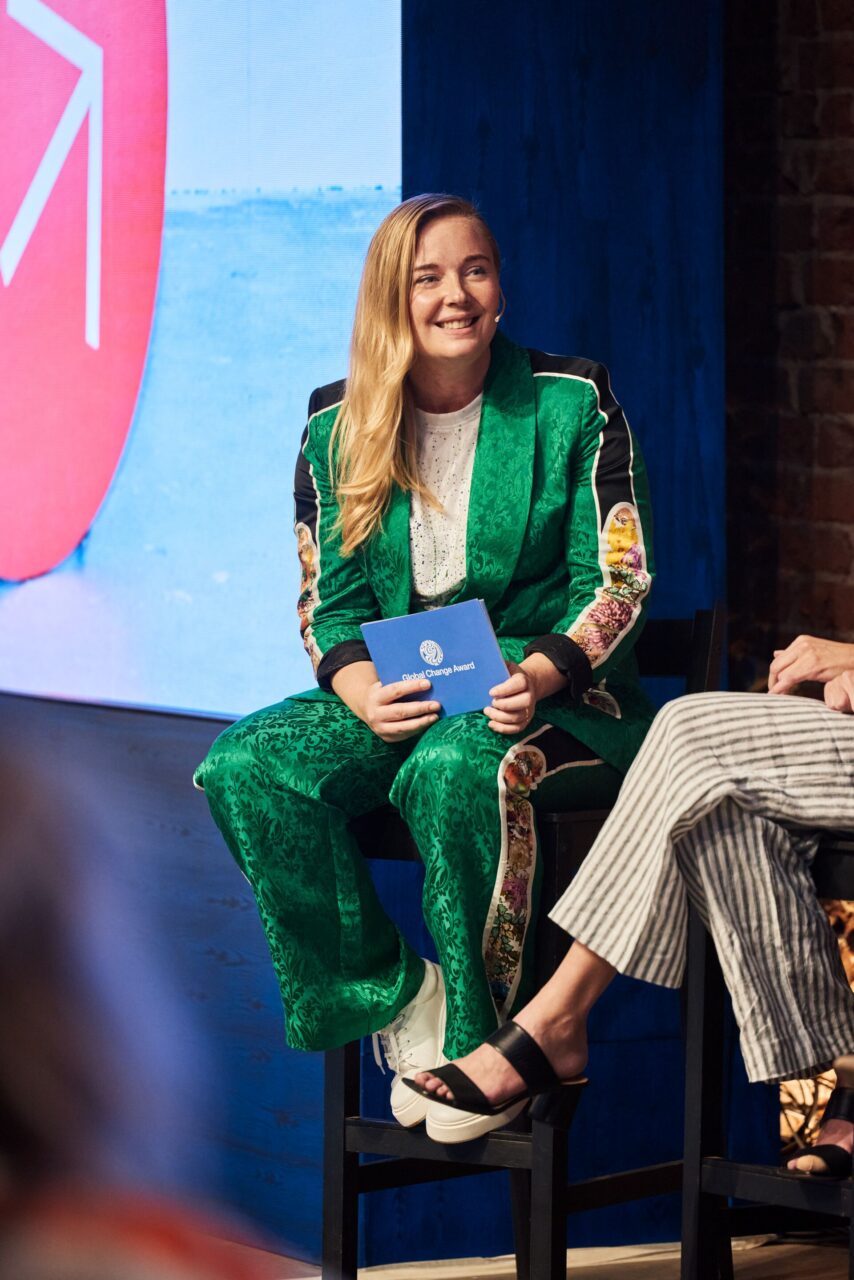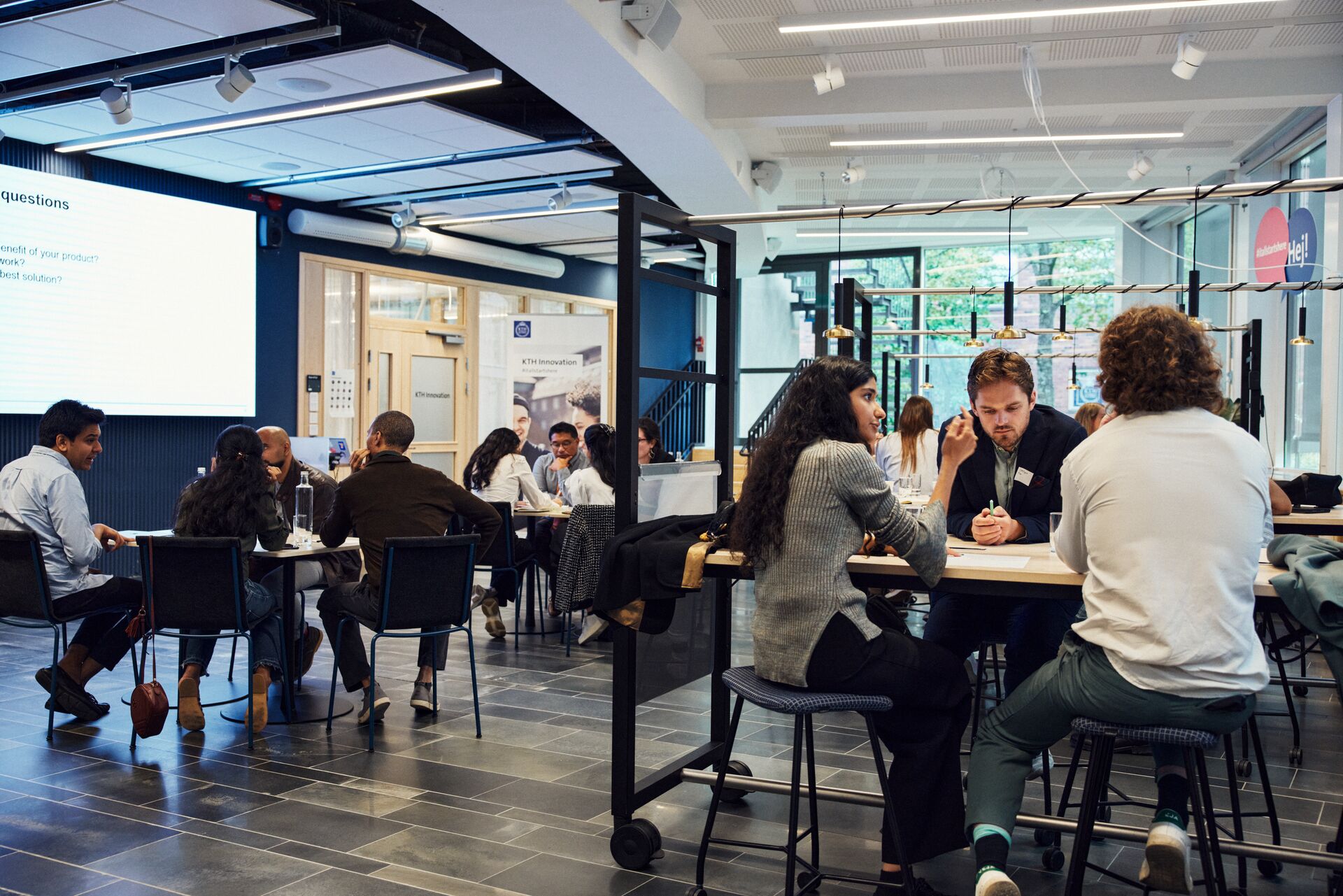Meet the winners of Global Change Award 2025
Each year, the Global Change Award backs early-stage innovations that could help transform the textile industry. The ten winners of 2025 are no exception. Selected for their bold and pioneering ideas, these changemakers are tackling some of fashion’s most urgent challenges: from reducing emissions and energy use, to enabling circularity and cleaner materials. They are ten winners with one shared mission: decarbonising the textile and fashion industry.

The Global Change Award looks for innovations across four areas in the textile industry:
- Responsible production – innovations in energy efficiency, waste management, traceability, on-demand and renewable energy.
- Sustainable materials and processes – ideas in low-energy materials, sustainable energy practices, new and recycled fibres and alternative wet processes, treatments and finishes.
- Mindful consumption – solutions that extend garment life cycles, enable circular business models, and reshape demand.
- Wildcards – unexpected, game-changing ideas that could accelerate industry-wide transformation.
What unites all winners is their potential to contribute to a fashion and textile industry that stays within planetary boundaries while promoting a just transition for people and communities.
This year’s winners are not just solving problems; they’re rethinking the systems behind them. Their ideas reflect the kind of early-stage innovation we need to unlock system-level change, and remind us that transformation starts with brave, often uncertain steps.
Annie Lindmark, Programme Director, H&M Foundation

These are the 2025 winners – and the bold innovations redefining what’s possible:
Responsible production

DECORPET
Energy-efficient decolouring that enables high-quality recycled PET for the textile industry.
Changemakers: Youbing Mu, Xiaobo Wan & Shuang Su
Country: China
DecoRpet uses a low-temperature process to remove nearly all dyes and impurities from polyester, delivering 99.9% pure material for high-quality recycling – and cutting energy use by 30%.
What sets it apart:
- Makes textile-to-textile polyester recycling more scalable and energy-efficient
- Enables high-quality recycled PET from mixed-composition fabrics
- Simplifies the recycling process while reducing environmental impact
THERMAL CYCLONES
Electric heat pumps replacing fossil-fuel steam with energy-efficient heat.
Changemakers: James Parkin & Chris Benson
Country: United Kingdom
This innovation replaces outdated gas and oil steam boilers with high-performance heat pumps powered by electricity, reducing energy use by over 75%.
What sets it apart:
- Directly replaces fossil-fuel boilers with minimal infrastructure changes
- Reduces operational energy costs and emissions
- Has potential for broader industrial use, including in food and beverage industries
PULPATRONICS
Chipless, metal-free RFID tags laser-printed on paper for low-impact traceability.
Changemakers: Chloe So & Barna Soma Biro
Country: United Kingdom
PulpaTronics offers recyclable, low-cost RFID tags made with carbon-based materials, eliminating metal and microchips while maintaining performance.
What sets it apart:
- Reduces e-waste and environmental impact of traceability tech
- Under current lab-tested conditions, the tags can be recycled up to 7 times and are compatible with current systems
- Enables circularity in logistics with a lower cost and materials footprint
linkedin.com/company/pulpatronics
Mindful consumption

LOOM
Digital upcycling connecting wardrobes with designers.
Changemaker: Daisy Harvey
Country: United Kingdom
Loom is a tech-powered platform that connects users with designers to upcycle unworn garments into one-of-a-kind pieces – diverting textile waste and supporting circular fashion.
What sets it apart:
- Creates new value from garments already in circulation
- Supports brands in tackling overstock and returns
- Empowers independent designers and scales the upcycling industry
Sustainable materials & processes

CIRCULARFABRICS
High-quality nylon recovery from blended textile waste
Changemakers: Josephine Mayer, Miguel Chacon-Teran, Ruben Serrano
Country: Germany
NYLOOP® technology by CircularFabrics extracts high-quality nylon from blended textile waste without breaking down the fibre, making circular nylon production possible.
What sets it apart:
- Eliminates the need for virgin nylon
- Avoids depolymerisation while preserving fibre performance
- Scalable, portable tech suitable for global manufacturing hubs
linkedin.com/company/circularfabrics
A BLUNT STORY
Bio-based soles made from agricultural waste, plant-derived and recycled materials
Changemaker: Chandni Batra
Country: India
UNCRUDE® is a sole material made from agricultural waste, plant-based ingredients and recycled content, designed to reduce reliance on fossil-based plastics in footwear soles.
What sets it apart:
- Reduces microplastics and dependency on crude oil
- Supports clean chemistry and farmer livelihoods
- Integrates into existing footwear production systems
BRILLIANT DYES
Natural dyes from algae, made with low-energy extraction
Changemaker: Mohammad Redwanur Rahman
Country: United Kingdom
Brilliant Dyes harnesses phycocyanin from cyanobacteria to produce biodegradable, non-toxic dyes through a low-energy process that supports a cleaner colour supply chain.
What sets it apart:
- Offers a scalable, cost-effective alternative to synthetic dyes
- Potential to halve the footprint of indigo dyeing
- Creates secondary benefits like fertilizer and animal feed from by-products
DECARBONIZATION LAB
An R&D hub pioneering low-emission dyeing, finishing and textile treatment
Changemaker: Mohammad Abbas Uddin
Country: Bangladesh
This lab bridges academia and industry to develop and test low-emission processes in dyeing and finishing – offering factories and workers practical tools to modernise production.
What sets it apart:
- Empowers factories to adopt lower-impact processes confidently
- Promotes collaboration between academia, workers, and producers
- Provides a model for replicable decarbonisation in global dyehouses
RENASENS
Waterless recycling of blended textile waste into high-quality raw materials
Changemaker: Jade A. Bouledjouidja
Country: Sweden
Renasens has created a waterless process with no harmful chemicals to recycle blended textiles without depolymerisation, maintaining fibre integrity and reducing microplastic pollution.
What sets it apart:
- Bridges the gap between mechanical and chemical recycling
- Turns textile waste into high-quality materials while avoiding hazardous chemicals.
- Reduces reliance on virgin fibre while preserving performance
Wildcards

THE REVIVAL CIRCULARITY LAB
Upcycling textile waste through community-led design in the Kantamanto Market
Changemaker: Yayra Agbofah
Country: Ghana
This creative hub transforms unsellable garments into new products through repair, design and local artisan training, extending textile lifespans while supporting community livelihoods.
What sets it apart:
- Builds circularity from the ground up through community ownership
- Combines innovation, education, and employment
- Prototypes reuse at scale for everything from apparel to construction materials
What’s next for our winners?
Each winner receives a €200,000 grant and joins the yearlong GCA Changemaker Programme, delivered by H&M Foundation with strategic partners Accenture and KTH Royal Institute of Technology. The programme supports winners with innovation coaching, systems thinking tools and leadership development to help bring their ideas closer to real-world impact.
How can you support?
Every bold idea starts somewhere, and the earliest steps are often the hardest. This is when resources are limited, networks are small, and the road ahead is full of unknowns. That’s why visibility and support from across the industry matter so much. So how can you help? Connect these changemakers with people who can open doors. Share their stories. Explore how their ideas could create impact in your corner of the value chain. Because big change doesn’t happen alone – it takes a movement.
Press contact

Media Relations Responsible
In brief
The Global Change Award supports ten early-stage innovations each year to help decarbonise fashion – with funding, coaching and systems thinking support.


